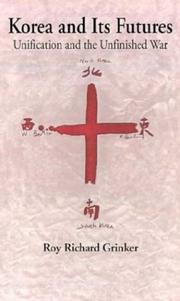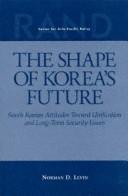| Listing 1 - 10 of 27 | << page >> |
Sort by
|
Book
ISBN: 1641770694 1641770686 9781641770699 9781641770682 Year: 2019 Publisher: New York
Abstract | Keywords | Export | Availability | Bookmark
 Loading...
Loading...Choose an application
- Reference Manager
- EndNote
- RefWorks (Direct export to RefWorks)

ISBN: 0585243514 9780585243511 0833027212 9780833027214 Year: 1999 Publisher: Santa Monica, CA : RAND,
Abstract | Keywords | Export | Availability | Bookmark
 Loading...
Loading...Choose an application
- Reference Manager
- EndNote
- RefWorks (Direct export to RefWorks)
This study examines four alternative scenarios that would result in the unification of the Korean peninsula. The authors describe the defining characteristics of each scenario, potential indicators that would predict specific outcomes, some possible variations in paths to unification, and some operational implications for the U.S. Army under different conditions and circumstances. The four scenarios (peaceful unification, collapse and absorption, unification through armed conflict, and disequilibrium and external intervention) highlight both the increasing vulnerabilities of the North Korean state and the substantial uncertainties that attach to each outcome and to the potential U.S. policy responses. These considerations impose major conceptual, policy, and operational challenges both in the near and middle term and in the postunification peninsular security environment. Each warrants an enhanced analysis and assessment effort, lest U.S. and ROK policymakers find themselves ill prepared for major challenges to alliance management and to the U.S. Army role in a future crisis.

ISBN: 0312210914 9780312210915 Year: 1998 Publisher: New York S. Martin's Press
Abstract | Keywords | Export | Availability | Bookmark
 Loading...
Loading...Choose an application
- Reference Manager
- EndNote
- RefWorks (Direct export to RefWorks)
Technisch blijven Noord en Zuid-Korea na veertig jaar op voet van oorlog met elkaar leven. Roy Grinker stelt dat het voortdurende conflict en de kansen op hereniging begrepen moeten worden vanuit een breder sociaal en cultureel perspectief. Van belang is zijn stelling dat Zuid-Korea is uitgegroeid tot een natie waarin de economische, politieke en culturele identiteit grotendeels gedefinieerd zijn vanuit de verschillen met het noorden. Hereniging, hoewel vooropgesteld als een heilig doel, zou het wereld- en zelfbeeld van de Zuid-Koreanen volledig onderuit halen.
Korean reunification question (1945- ) --- 811 Filosofie --- 815 Geschiedenis --- 841 Politiek Bestel --- 850 Vrede- en conflictstudies --- 856.1 Conflictpreventie --- 860 (Vredes)cultuur --- 883.2 Oost-Azië --- Korean unification question (1945- ) --- Reunification of Korea (1945- ) --- Unification of Korea (1945- )

ISBN: 0833043498 0585163847 9780585163840 9780833043498 9780833027597 083302759X Year: 1999 Publisher: Santa Monica, Calif. Prepared for the Korean Foundation [by] RAND
Abstract | Keywords | Export | Availability | Bookmark
 Loading...
Loading...Choose an application
- Reference Manager
- EndNote
- RefWorks (Direct export to RefWorks)
National security --- Korean reunification question (1945- ) --- Public opinion --- Korean unification question (1945- ) --- Reunification of Korea (1945- ) --- Unification of Korea (1945- ) --- National security policy --- NSP (National security policy) --- Security policy, National --- Economic policy --- International relations --- Military policy --- Public opinion. --- Government policy
Periodical
ISSN: 23840692 Year: 2015 Publisher: Seoul : The Institute of the Humanities for Unification,
Abstract | Keywords | Export | Availability | Bookmark
 Loading...
Loading...Choose an application
- Reference Manager
- EndNote
- RefWorks (Direct export to RefWorks)
Korean reunification question (1945- ) --- Korea --- Korea. --- Korean unification question (1945- ) --- Reunification of Korea (1945- ) --- Unification of Korea (1945- ) --- Chōsen --- Chōsen Sōtokufu --- Chosŏn --- Chosŏn Chʻongdokpu --- Chosun --- Corea --- Corée --- Daikan Teikoku --- Government-General of Chosen --- ChoÌsen --- ChoÌsen SoÌtokufu --- ChosoÌn --- ChosoÌn ChÊ»ongdokpu --- CoreÌe

ISBN: 0833037625 9786612282973 1282282972 0833040782 Year: 2005 Publisher: Santa Monica, CA : RAND Corporation,
Abstract | Keywords | Export | Availability | Bookmark
 Loading...
Loading...Choose an application
- Reference Manager
- EndNote
- RefWorks (Direct export to RefWorks)
Analyzes the economic, political, and security issues associated with Korean unification and considers what the capital costs of unification would be under differing circumstances and assumptions.
Korea (North) -- Economic policy. --- Korea (North) -- Politics and government. --- Korean reunification question (1945- ). --- Korean reunification question (1945- ) --- Security, International. --- Korea (North) --- Economic policy. --- Politics and government. --- Collective security --- International security --- International relations --- Disarmament --- International organization --- Peace --- Korean unification question (1945- ) --- Reunification of Korea (1945- ) --- Unification of Korea (1945- )
Book
ISBN: 9788997578429 8997578421 Year: 2012 Publisher: Seoul Yonsei University Press
Abstract | Keywords | Export | Availability | Bookmark
 Loading...
Loading...Choose an application
- Reference Manager
- EndNote
- RefWorks (Direct export to RefWorks)
Korean reunification question (1945- ) --- Korea (South) --- Korea (North) --- Foreign relations --- K9549 --- Korean unification question (1945- ) --- Reunification of Korea (1945- ) --- Unification of Korea (1945- ) --- Korea: International politics, law and relations -- North-South relation --- Korea (South) - Foreign relations - Korea (North) --- Korea (North) - Foreign relations - Korea (South)
Book
ISBN: 9788962970180 896297018X Year: 2010 Publisher: Paju Jimoondang
Abstract | Keywords | Export | Availability | Bookmark
 Loading...
Loading...Choose an application
- Reference Manager
- EndNote
- RefWorks (Direct export to RefWorks)
Korean reunification question (1945- ) --- Korea (South) --- Korea (North) --- Foreign relations --- Politics and government --- K9549 --- Korean unification question (1945- ) --- Reunification of Korea (1945- ) --- Unification of Korea (1945- ) --- Korea: International politics, law and relations -- North-South relation --- Politics and government. --- Korea (South) - Foreign relations - Korea (North) --- Korea (North) - Foreign relations - Korea (South) --- Korea (South) - Politics and government

ISBN: 0295801271 9780295801278 0295981296 9780295981291 Year: 2001 Publisher: Seattle National Bureau of Asian Research in association with University of Washington Press
Abstract | Keywords | Export | Availability | Bookmark
 Loading...
Loading...Choose an application
- Reference Manager
- EndNote
- RefWorks (Direct export to RefWorks)
World politics --- Korean reunification question (1945- ) --- Coexistence (World politics) --- Peaceful coexistence --- Korean unification question (1945- ) --- Reunification of Korea (1945- ) --- Unification of Korea (1945- ) --- East Asia --- Korea (North) --- Korea (South) --- Politics and government. --- Economic policy. --- World politics - 1945 --- -Korea (South) - Economic policy --- Korea (North) - Politics and government --- East Asia - Politics and government
Book
ISBN: 1626375623 1626374201 Year: 2016 Publisher: Boulder, Colorado : FirstForumPress, a division of Lynne Rienner Publishers, Incorporated,
Abstract | Keywords | Export | Availability | Bookmark
 Loading...
Loading...Choose an application
- Reference Manager
- EndNote
- RefWorks (Direct export to RefWorks)
Why have traditional views of national identity in South Korea-views that for years drove a demand for reunification-been challenged so dramatically in recent years? What explains the growing ambivalence and even antagonism of South Korean young people toward unification with North Korea? Emma Campbell addresses these related puzzles, exploring the emergence of a new kind of nationalism in South Korea and considering what this development means for the country's future.
Korean reunification question (1945- ) --- Nationalism --- Korea (South) --- Politics and government. --- Consciousness, National --- Identity, National --- National consciousness --- National identity --- International relations --- Patriotism --- Political science --- Autonomy and independence movements --- Internationalism --- Political messianism --- Korean unification question (1945- ) --- Reunification of Korea (1945- ) --- Unification of Korea (1945- )
| Listing 1 - 10 of 27 | << page >> |
Sort by
|

 Search
Search Feedback
Feedback About UniCat
About UniCat  Help
Help News
News